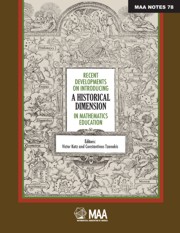Book contents
- Frontmatter
- Preface
- Contents
- 1 Teaching with Primary Historical Sources: Should it Go Mainstream? Can it?
- 2 Dialogismin Mathematical Writing: Historical, Philosophical and Pedagogical Issues
- 3 The Process of Mathematical Agreement: Examples from Mathematics History and an Experimental Sequence of Activities
- 4 Researching the History of Algebraic Ideas from an Educational Point of View
- 5 Equations and Imaginary Numbers: A Contribution from Renaissance Algebra
- 6 The Multiplicity of Viewpoints in Elementary Function Theory: Historical and Didactical Perspectives
- 7 From History to Research in Mathematics Education: Socio-Epistemological Elements for Trigonometric Functions
- 8 Harmonies in Nature: A Dialogue Between Mathematics and Physics
- 9 Exposure to Mathematics in the Making: Interweaving Math News Snapshots in the Teaching of High-School Mathematics
- 10 History, Figures and Narratives in Mathematics Teaching
- 11 Pedagogy, History, and Mathematics: Measure as a Theme
- 12 Students' Beliefs About the Evolution and Development of Mathematics
- 13 Changes in Student Understanding of Function Resulting from Studying Its History
- 14 Integrating the History of Mathematics into Activities Introducing Undergraduates to Concepts of Calculus
- 15 History in a Competence Based Mathematics Education: A Means for the Learning of Differential Equations
- 16 History of Statistics and Students' Difficulties in Comprehending Variance
- 17 Designing Student Projects for Teaching and Learning Discrete Mathematics and Computer Science via Primary Historical Sources
- 18 History of Mathematics for Primary School Teacher Education Or: Can You Do Something Even if You Can't Do Much?
- 19 Reflections and Revision: Evolving Conceptions of a Using History Course
- 20 Mapping Our Heritage to the Curriculum: Historical and Pedagogical Strategies for the Professional Development of Teachers
- 21 Teachers' Conceptions of History of Mathematics
- 22 The Evolution of a Community of Mathematical Researchers in North America: 1636–1950
- 23 The Transmission and Acquisition of Mathematics in Latin America, from Independence to the First Half of the Twentieth Century
- 24 In Search of Vanishing Subjects: The Astronomical Origins of Trigonometry
- About the Editors
7 - From History to Research in Mathematics Education: Socio-Epistemological Elements for Trigonometric Functions
- Frontmatter
- Preface
- Contents
- 1 Teaching with Primary Historical Sources: Should it Go Mainstream? Can it?
- 2 Dialogismin Mathematical Writing: Historical, Philosophical and Pedagogical Issues
- 3 The Process of Mathematical Agreement: Examples from Mathematics History and an Experimental Sequence of Activities
- 4 Researching the History of Algebraic Ideas from an Educational Point of View
- 5 Equations and Imaginary Numbers: A Contribution from Renaissance Algebra
- 6 The Multiplicity of Viewpoints in Elementary Function Theory: Historical and Didactical Perspectives
- 7 From History to Research in Mathematics Education: Socio-Epistemological Elements for Trigonometric Functions
- 8 Harmonies in Nature: A Dialogue Between Mathematics and Physics
- 9 Exposure to Mathematics in the Making: Interweaving Math News Snapshots in the Teaching of High-School Mathematics
- 10 History, Figures and Narratives in Mathematics Teaching
- 11 Pedagogy, History, and Mathematics: Measure as a Theme
- 12 Students' Beliefs About the Evolution and Development of Mathematics
- 13 Changes in Student Understanding of Function Resulting from Studying Its History
- 14 Integrating the History of Mathematics into Activities Introducing Undergraduates to Concepts of Calculus
- 15 History in a Competence Based Mathematics Education: A Means for the Learning of Differential Equations
- 16 History of Statistics and Students' Difficulties in Comprehending Variance
- 17 Designing Student Projects for Teaching and Learning Discrete Mathematics and Computer Science via Primary Historical Sources
- 18 History of Mathematics for Primary School Teacher Education Or: Can You Do Something Even if You Can't Do Much?
- 19 Reflections and Revision: Evolving Conceptions of a Using History Course
- 20 Mapping Our Heritage to the Curriculum: Historical and Pedagogical Strategies for the Professional Development of Teachers
- 21 Teachers' Conceptions of History of Mathematics
- 22 The Evolution of a Community of Mathematical Researchers in North America: 1636–1950
- 23 The Transmission and Acquisition of Mathematics in Latin America, from Independence to the First Half of the Twentieth Century
- 24 In Search of Vanishing Subjects: The Astronomical Origins of Trigonometry
- About the Editors
Summary
Introduction
We propose to investigate the construction of the trigonometric function from a perspective that challenges what the educational system ‘teaches’ and, consequently, how the student learns; this implies questioning not only how we teach, but what we teach. By means of the theoretical perspective of Socioepistemology [5, 6, 2] we intend to recognize the uses and significations associated with the trigonometric functions in a particular historical setting.
This theoretical perspective problematizes the knowledge confronting the mathematics of the educational system with the uses of knowledge in different settings, like historical, professional, or even school settings when experiencing non-traditional pedagogical proposals. The purpose of this paper is to recognize those significations that belong to knowledge but usually become diluted, altered or lost when setting up a school discourse.
There is a change from the didactical approaches concerned with the design of accessible presentations for school mathematics content or strongly centered on cognitive aspects to recognizing socio-cultural settings as part of the explanation of didactical phenomena. In this last paradigm, the socio-epistemological research framework focuses its attention on the normative role of social practices in the construction of mathematical knowledge: that which makes human individuals and groups do what they do [10].
This allows us to extend the didactical or cognitive explanations, dominant in the literature, about didactical phenomena related to the trigonometric functions. In this respect, before proposing educational innovations, we seek to recognize in the historical significations and uses, elements that help to explain didactical phenomena and then, based on epistemologies of practices, re-design the school mathematical discourse.
- Type
- Chapter
- Information
- Publisher: Mathematical Association of AmericaPrint publication year: 2011
- 1
- Cited by



